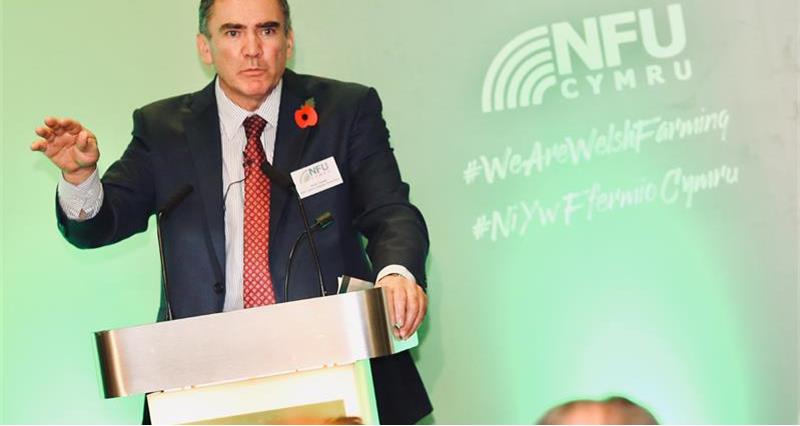Last autumn, NFU Cymru provided both written and oral evidence to the committee’s inquiry into The economic and cultural impacts of trade and environmental policy on family farms in Wales. The union is pleased that many of the points made in its evidence to the committee have been picked up in the report and recommendations.
Family farms make unparalleled contribution
NFU Cymru President Aled Jones said “Family farms make an unparalleled contribution to the economic, environmental, cultural and social fabric of Wales. The way in which our patchwork of family farms contribute to the very fabric of Wales means that it is often difficult to assign a monetary value to their contribution. NFU Cymru is firmly of the view that Wales would be culturally impoverished if our family farming structure were to be harmed or diminished in any way.
“Farmers in Wales maintain the Welsh landscape, they also continue to maintain its language and cultural traditions, and in so doing preserve our heritage and sense of place for future generations. Those working in the agricultural industry are often at the heart of many rural communities across the country, as part of community groups, or in voluntary or leadership roles throughout rural Wales, and Welsh farmers make a key contribution towards the provision of attractive, viable, safe communities in rural areas.
"NFU Cymru is firmly of the view that Wales would be culturally impoverished if our family farming structure were to be harmed or diminished in any way."
Aled Jones
“Given the scale of our industry’s contribution, I am pleased that the committee has recommended that the UK Government should consider how its approach to relevant reserved policy areas can help protect the unique cultural contribution of Welsh farming communities. I agree with the committee that the UK Government should add cultural impacts to the impact assessment process for future trade negotiations, as well as to the terms of reference for the work of the Trade and Agriculture Commission.”
Wales-specific impact assessment
NFU Cymru also welcomes the recommendation of the committee that the UK government should publish a statement on the impact of free trade agreements (FTAs) on the agricultural sector in Wales. The committee's report credits the sector’s distinctive characteristics and calls for the UK Government to publish its cumulative impact modelling data on FTAs.
Aled Jones said: “It is only by conducting a Wales-specific impact assessment that we can have a proper understanding of the implications of future trade deals for Wales. Without such an examination there is a serious risk of doing great damage to Wales’ rural communities. By conducting a Wales-specific impact assessment, some of these adverse impacts can be forecast and potentially mitigated.
Increase in number of agriculture counsellors deployed
“Exports of agri-food products are extremely important to Wales. Fair and balanced trade deals can also offer opportunities to grow markets abroad. We are keen to see the UK Government increase the number of agriculture counsellors deployed in countries that offer the potential for increased export sales. We believe it is vital that these counsellors work closely with industry and governments across the devolved nations of the UK.”
The committee has also called for greater transparency and information being required about the purchase of viable farmland in Wales by corporations for carbon offset schemes. The committee suggests that greater transparency may be achieved by the creation of a register of carbon offset schemes so that the extent of the problem can be monitored.
Purchasing land in order to plant trees
Aled Jones said: “Speculation about future carbon trading has led to many large co-operations purchasing Welsh land in order to plant it with trees. Once this land is planted with trees, it may never revert to agricultural production and so our primary production base is eroded. The large-scale planting of trees has a dramatic impact of the appearance of our landscape and can also have detrimental impacts on rural communities, as large corporations with considerable resources are able to outbid local farmers when land comes up for sale
“NFU Cymru, through its Growing Together strategy for sustainably increasing tree cover in Wales, has called for a decision-making framework to guide land use change decisions so that the long term economic, environmental, social and cultural impacts of large scale planting of trees can be properly assessed.
“We believe that Welsh farmers are best placed to manage land for a range of economic and environmental outcomes. We favour an approach that integrates woodland into farming systems for multiple benefits without compromising the viability of our family farms, food production or our rural communities.”
Watch an interview by our Political Adviser Huw Thomas on BBC Radio Cymru Bwletin Amaeth.
